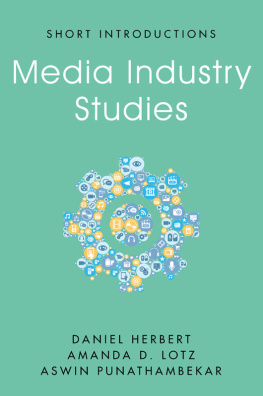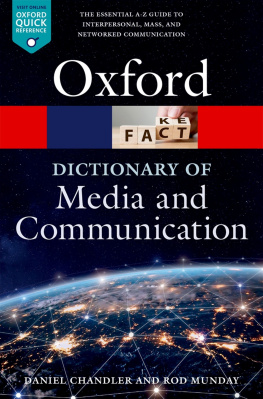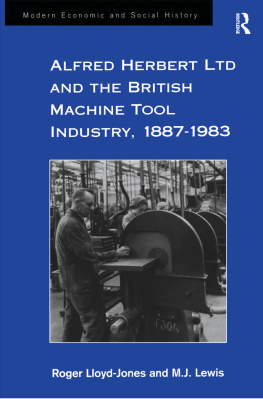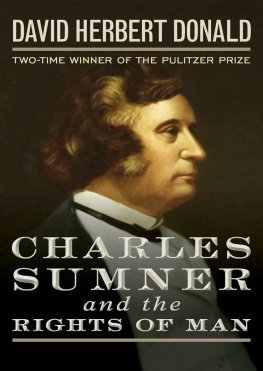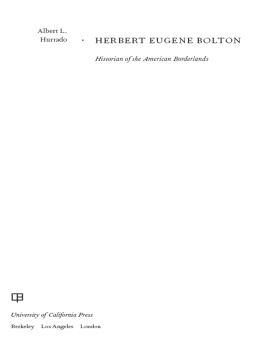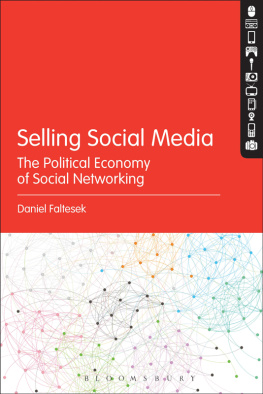Daniel Herbert - Media Industry Studies
Here you can read online Daniel Herbert - Media Industry Studies full text of the book (entire story) in english for free. Download pdf and epub, get meaning, cover and reviews about this ebook. year: 2020, publisher: Polity Press, genre: Politics. Description of the work, (preface) as well as reviews are available. Best literature library LitArk.com created for fans of good reading and offers a wide selection of genres:
Romance novel
Science fiction
Adventure
Detective
Science
History
Home and family
Prose
Art
Politics
Computer
Non-fiction
Religion
Business
Children
Humor
Choose a favorite category and find really read worthwhile books. Enjoy immersion in the world of imagination, feel the emotions of the characters or learn something new for yourself, make an fascinating discovery.
- Book:Media Industry Studies
- Author:
- Publisher:Polity Press
- Genre:
- Year:2020
- Rating:3 / 5
- Favourites:Add to favourites
- Your mark:
- 60
- 1
- 2
- 3
- 4
- 5
Media Industry Studies: summary, description and annotation
We offer to read an annotation, description, summary or preface (depends on what the author of the book "Media Industry Studies" wrote himself). If you haven't found the necessary information about the book — write in the comments, we will try to find it.
Media Industry Studies — read online for free the complete book (whole text) full work
Below is the text of the book, divided by pages. System saving the place of the last page read, allows you to conveniently read the book "Media Industry Studies" online for free, without having to search again every time where you left off. Put a bookmark, and you can go to the page where you finished reading at any time.
Font size:
Interval:
Bookmark:

- Nicholas Abercrombie, Sociology
- Michael Bury, Health and Illness
- Raewyn Connell and Rebecca Pearse, Gender, 3rd edition
- Hartley Dean, Social Policy, 3rd edition
- Lena Dominelli, Introducing Social Work
- Jonathan Gray and Amanda D. Lotz, Television Studies, 2nd edition
- Jeffrey Haynes, Development Studies
- Stuart Henry, with Lindsay M. Howard, Social Deviance, 2nd edition
- Daniel Herbert, Amanda D. Lotz, and Aswin Punathambekar, Media Industry Studies
- Stephanie Lawson, International Relations, 3rd edition
- Ronald L. Mize, Latina/o Studies
- Chris Rojek, Cultural Studies
- Mary Romero, Introducing Intersectionality
- Karen Wells, Childhood Studies
Daniel Herbert, Amanda D. Lotz, and Aswin Punathambekar
polity
Copyright Daniel Herbert, Amanda D. Lotz, and Aswin Punathambekar 2020
The right of Daniel Herbert, Amanda D. Lotz, and Aswin Punathambekar to be identified as Authors of this Work has been asserted in accordance with the UK Copyright, Designs, and Patents Act 1988.
First published in 2020 by Polity Press
Polity Press
65 Bridge Street
Cambridge CB2 1UR, UK
Polity Press
101 Station Landing
Suite 300
Medford, MA 02155, USA
All rights reserved. Except for the quotation of short passages for the purpose of criticism and review, no part of this publication may be reproduced, stored in a retrieval system or transmitted, in any form or by any means, electronic, mechanical, photocopying, recording or otherwise, without the prior permission of the publisher.
ISBN-13: 978-1-5095-3777-8 (hardback)
ISBN-13: 978-1-5095-3778-5 (paperback)
A catalogue record for this book is available from the British Library.
Library of Congress Cataloging-in-Publication Data
Names: Herbert, Daniel, 1974- author. | Lotz, Amanda D., 1974- author. | Punathambekar, Aswin, author.
Title: Media industry studies / Daniel Herbert, Amanda D. Lotz and Aswin Punathambekar.
Description: Cambridge, UK ; Medford, MA : Polity, 2020. | Series: Short introductions | Includes bibliographical references and index. | Summary: This text provides the roadmap to the vibrant area of Media Industry studies-- Provided by publisher.
Identifiers: LCCN 2019036734 (print) | LCCN 2019036735 (ebook) | ISBN 9781509537778 (hardback) | ISBN 9781509537785 (paperback) | ISBN 9781509537792 (epub)
Subjects: LCSH: Mass media--Study and teaching.
Classification: LCC P91.3 .H46 2020 (print) | LCC P91.3 (ebook) | DDC 384--dc23
LC record available at https://lccn.loc.gov/2019036734
LC ebook record available at https://lccn.loc.gov/2019036735
Typeset in 10 on 12pt Sabon
by Fakenham Prepress Solutions, Fakenham, Norfolk NR21 8NL
Printed and bound in Great Britain by CPI Group (UK) Ltd, Croydon
The publisher has used its best endeavors to ensure that the URLs for external websites referred to in this book are correct and active at the time of going to press. However, the publisher has no responsibility for the websites and can make no guarantee that a site will remain live or that the content is or will remain appropriate.
Every effort has been made to trace all copyright holders, but if any have been overlooked the publisher will be pleased to include any necessary credits in any subsequent reprint or edition.
For further information on Polity, visit our website: politybooks.com
For our mentors, peers, and students
This book grew out of many conversations, both among the three of us and many shared with others. They were often conversations in which we tried to pin down what it is we do and how we do it. While these pages formalize the deeper and systematic conversation weve shared, we intend it as the continuation of a conversation. We thank those of you who have engaged with us in this conversation, formally and informally, often as our mentors and students, but many also as collaborators and peers.
This precise book developed on the 5th and half floor of North Quad over the past few years. Our conversations were deeply influenced by colleagues Paddy Scannell, Megan Ankerson, Katherine Sender, Sarah Murray, and Yeidy Rivero. Much was also worked out in conversations with students including Jimmy Draper, Annemarie Navar-Gill, Kitior Ngu, and in the space of the Media Studies Research Workshop as well as the multiple iterations of the Analyzing Media Industries seminar.
Our uncertainties sent us asking questions of others. Many thanks to Janet Staiger, Joseph Turow, Graham Murdock, Eileen Meehan, Michele Hilmes, and Philip Schlesinger for their assistance in tracing the history of the field. The list of peers and collaborators who helped us to shape our sense of the field is too long to recount, but thanks to C. W. Anderson, Nitin Govil, David Hesmondhalgh, Lee Marshall, Jeremy Morris, John Thompson, and Nikki Usher for assistance with areas outside our central expertise.
Our sincere appreciation to Ramon Lobato for reading an early draft and offering feedback that challenged us to do better. Thanks as well for feedback from Sriram Mohan, Anna Sampson, Michael Wayne, and our most excellent research assistant, Rae Moors. We are also thankful for the considerable support of Politys reviewers, and Mary Savigar, Ellen MacDonald-Kramer, and the Polity editorial and production team.
And finally, our thanks to our families for cheerfully putting up with phone calls and Skype conversations at odd hours and other absences required to bring this to completion.
I want to study YouTube as a media industry, announces a new student. OK, what kind of study? There are numerous potential research projects one could design with a focus on YouTube as a major site of media production and circulation. Or, YouTube could serve as a case from which to make broader claims about various sectors and practices of digital media industries and their intricate links with established screen industries in an era of seemingly unfettered global connectivity.
One potential study would focus on the people who make YouTube videos; not just the creators and influencers with millions of followers worldwide, but also the many millions of people who create and circulate videos across an astonishing range of genres. There are many questions that we could pose about their practice. It would also be possible to study the content moderators whose daily, routine work involves scanning hundreds, if not thousands, of videos that have been flagged by automated systems for content review for potential violation of YouTube standards of acceptability. Or, delving a bit deeper, you could focus attention on the engineers who design the content moderation algorithms. You could do interviews, observe them in their roles for a period of time, attend industry events designed for professionals in the digital technology and media industries, and try to understand the broader work culture within which a range of people go about their routines. There are many ways to study any of these groups of media workers and many sound reasons to do so.
While a focus on specific individuals and their roles within YouTube and its specific production culture is valuable, you could also examine YouTube as an organization and explore questions related to its particular strategies as a social media company that circulates videos. Such a study would aim to build knowledge of the broader forces that shape the behavior of social media companies, such as their interactions with advertisers and their policies for dealing with the people who create the content on their services. A study of YouTube as an organization might build knowledge about how social media companies operate generally, but would do so by constructing a detailed understanding of how YouTubes strategies, practices, and aims lead it to create particular social media capabilities and limit others. It might address how the strategies for YouTube relate to broader activities of parent company Google.
Next pageFont size:
Interval:
Bookmark:
Similar books «Media Industry Studies»
Look at similar books to Media Industry Studies. We have selected literature similar in name and meaning in the hope of providing readers with more options to find new, interesting, not yet read works.
Discussion, reviews of the book Media Industry Studies and just readers' own opinions. Leave your comments, write what you think about the work, its meaning or the main characters. Specify what exactly you liked and what you didn't like, and why you think so.

